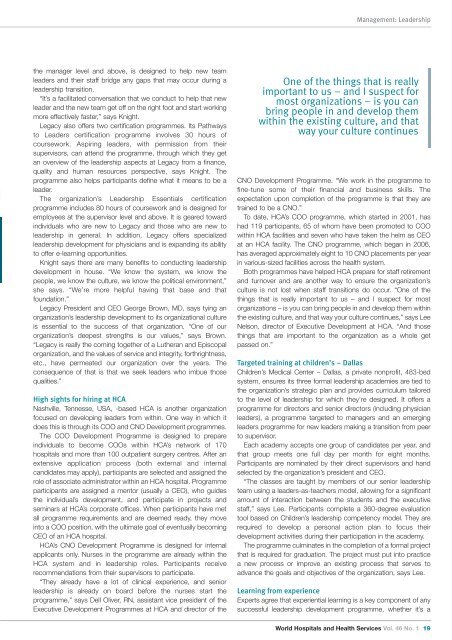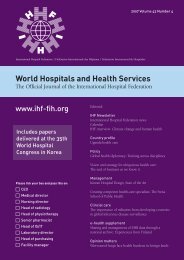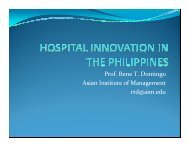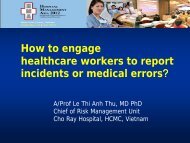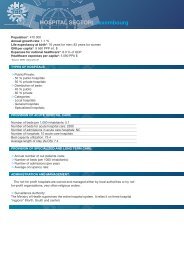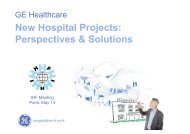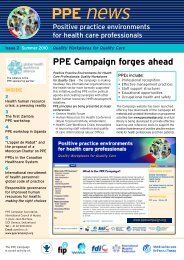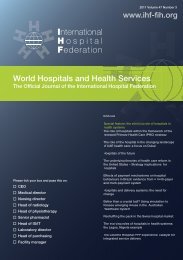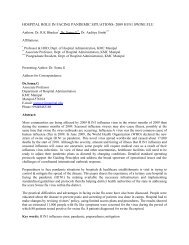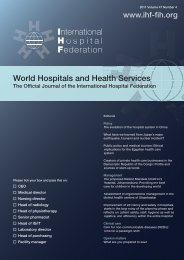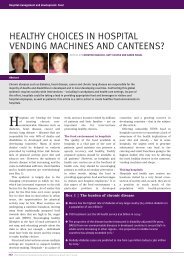vol46.1 LR.pdf - International Hospital Federation
vol46.1 LR.pdf - International Hospital Federation
vol46.1 LR.pdf - International Hospital Federation
You also want an ePaper? Increase the reach of your titles
YUMPU automatically turns print PDFs into web optimized ePapers that Google loves.
Management: Leadership<br />
the manager level and above, is designed to help new team<br />
leaders and their staff bridge any gaps that may occur during a<br />
leadership transition.<br />
“It’s a facilitated conversation that we conduct to help that new<br />
leader and the new team get off on the right foot and start working<br />
more effectively faster,” says Knight.<br />
Legacy also offers two certification programmes. Its Pathways<br />
to Leaders certification programme involves 30 hours of<br />
coursework. Aspiring leaders, with permission from their<br />
supervisors, can attend the programme, through which they get<br />
an overview of the leadership aspects at Legacy from a finance,<br />
quality and human resources perspective, says Knight. The<br />
programme also helps participants define what it means to be a<br />
leader.<br />
The organization’s Leadership Essentials certification<br />
programme includes 80 hours of coursework and is designed for<br />
employees at the supervisor level and above. It is geared toward<br />
individuals who are new to Legacy and those who are new to<br />
leadership in general. In addition, Legacy offers specialized<br />
leadership development for physicians and is expanding its ability<br />
to offer e-learning opportunities.<br />
Knight says there are many benefits to conducting leadership<br />
development in house. “We know the system, we know the<br />
people, we know the culture, we know the political environment,”<br />
she says. “We’re more helpful having that base and that<br />
foundation.”<br />
Legacy President and CEO George Brown, MD, says tying an<br />
organization’s leadership development to its organizational culture<br />
is essential to the success of that organization. “One of our<br />
organization’s deepest strengths is our values,” says Brown.<br />
“Legacy is really the coming together of a Lutheran and Episcopal<br />
organization, and the values of service and integrity, forthrightness,<br />
etc., have permeated our organization over the years. The<br />
consequence of that is that we seek leaders who imbue those<br />
qualities.”<br />
High sights for hiring at HCA<br />
Nashville, Tennesse, USA, -based HCA is another organization<br />
focused on developing leaders from within. One way in which it<br />
does this is through its COO and CNO Development programmes.<br />
The COO Development Programme is designed to prepare<br />
individuals to become COOs within HCA’s network of 170<br />
hospitals and more than 100 outpatient surgery centres. After an<br />
extensive application process (both external and internal<br />
candidates may apply), participants are selected and assigned the<br />
role of associate administrator within an HCA hospital. Programme<br />
participants are assigned a mentor (usually a CEO), who guides<br />
the individual’s development, and participate in projects and<br />
seminars at HCA’s corporate offices. When participants have met<br />
all programme requirements and are deemed ready, they move<br />
into a COO position, with the ultimate goal of eventually becoming<br />
CEO of an HCA hospital.<br />
HCA’s CNO Development Programme is designed for internal<br />
applicants only. Nurses in the programme are already within the<br />
HCA system and in leadership roles. Participants receive<br />
recommendations from their supervisors to participate.<br />
“They already have a lot of clinical experience, and senior<br />
leadership is already on board before the nurses start the<br />
programme,” says Dell Oliver, RN, assistant vice president of the<br />
Executive Development Programmes at HCA and director of the<br />
One of the things that is really<br />
important to us – and I suspect for<br />
most organizations – is you can<br />
bring people in and develop them<br />
within the existing culture, and that<br />
way your culture continues<br />
CNO Development Programme. “We work in the programme to<br />
fine-tune some of their financial and business skills. The<br />
expectation upon completion of the programme is that they are<br />
trained to be a CNO.”<br />
To date, HCA’s COO programme, which started in 2001, has<br />
had 119 participants, 65 of whom have been promoted to COO<br />
within HCA facilities and seven who have taken the helm as CEO<br />
at an HCA facility. The CNO programme, which began in 2006,<br />
has averaged approximately eight to 10 CNO placements per year<br />
in various-sized facilities across the health system.<br />
Both programmes have helped HCA prepare for staff retirement<br />
and turnover and are another way to ensure the organization’s<br />
culture is not lost when staff transitions do occur. “One of the<br />
things that is really important to us – and I suspect for most<br />
organizations – is you can bring people in and develop them within<br />
the existing culture, and that way your culture continues,” says Lee<br />
Nelson, director of Executive Development at HCA. “And those<br />
things that are important to the organization as a whole get<br />
passed on.”<br />
Targeted training at children’s – Dallas<br />
Children’s Medical Center – Dallas, a private nonprofit, 483-bed<br />
system, ensures its three formal leadership academies are tied to<br />
the organization’s strategic plan and provides curriculum tailored<br />
to the level of leadership for which they’re designed. It offers a<br />
programme for directors and senior directors (including physician<br />
leaders), a programme targeted to managers and an emerging<br />
leaders programme for new leaders making a transition from peer<br />
to supervisor.<br />
Each academy accepts one group of candidates per year, and<br />
that group meets one full day per month for eight months.<br />
Participants are nominated by their direct supervisors and hand<br />
selected by the organization’s president and CEO.<br />
“The classes are taught by members of our senior leadership<br />
team using a leaders-as-teachers model, allowing for a significant<br />
amount of interaction between the students and the executive<br />
staff,” says Lee. Participants complete a 360-degree evaluation<br />
tool based on Children’s leadership competency model. They are<br />
required to develop a personal action plan to focus their<br />
development activities during their participation in the academy.<br />
The programme culminates in the completion of a formal project<br />
that is required for graduation. The project must put into practice<br />
a new process or improve an existing process that serves to<br />
advance the goals and objectives of the organization, says Lee.<br />
Learning from experience<br />
Experts agree that experiential learning is a key component of any<br />
successful leadership development programme, whether it’s a<br />
World <strong>Hospital</strong>s and Health Services Vol. 46 No. 1 19


